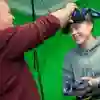


Learn from experts who've worked on BAFTA-winning games and led projects across Europe.
Spend a year in industry getting real-world experience with organisations from small studios to multinationals. And create a professional-standard portfolio to showcase your abilities to potential employers.
We combine hands-on skill with thought-provoking theory to prepare you for a career in this exciting industry and beyond. You’ll gain the essential skills required by the games business, as well as transferrable skills that are in demand across the creative industries.
About this course
Explore the world of games development and harness your talent across areas such as game design, game art, game audio and narrative design.
You’ll build your skills learning in industry-standard facilities including a virtual reality lounge, plus fully fitted PC and Mac design labs with the latest digital media software. You’ll have access to a range of software, including the Adobe collection for the creation of 2D graphic designs, multimedia pieces, and audio production.
As well as technical skills, you’ll develop vital knowledge in leadership and professional practice while working in a studio environment. Our close links to game companies and industry networks gives you invaluable opportunities such as game jams.
You could take part in Game Republic’s annual Student Showcase, competing with other students in the region, and presenting your final-year game design projects to potential employers. And gain real-world exposure work on virtual reality, augmented reality, or mixed reality projects in the public or private sector on a year in industry.
We take fun and games seriously
Module options
Each year, you’ll study modules worth a certain number of credits, and you need 120 credits per year. Most modules are 20 credits – so you’ll study six modules each year. Some longer modules, such as a dissertation, are worth more. In these cases, you’ll study fewer modules - but the number of credits will always add up to 120. Some modules are compulsory, some are optional, so you can build a course that’s right for you.
Filters
Game Design & Prototyping
Ready to start turning your game ideas into reality and build the foundation for a career in game design? Then this is the module for you.
You’ll cover key principles like game objects, rules, mechanics, goals and conflict.
You’ll learn to apply these concepts by developing your own game ideas and bringing them to life in engines like Unity and Unreal.
With hands-on experience you'll build environments, prototype mechanics, and learn essential scripting skills.
You’ll also dive into production tools like iterative design and documentation. Giving you the skills to create and manage your own game projects.
Take the first step toward shaping the future of gaming today.
compulsory
20 credits
2D Visual Design
Develop your 2D design skills to help you develop and produce media projects from lens-based to videogames. Explore the use of concept art in pre-production and develop practical experience of generating 2D video game assets.
compulsory
20 credits
Introduction to Game Audio
The creation and implementation of effective audio is central to game design –supporting dramatic story-telling, immersion, interactivity, game mechanics, as well as emotional and physiological engagement. In this module you will explore some of the creative and technical challenges faced when designing and implementing game audio. The knowledge and skills you acquire in this module will help you to use audio more effectively in your own game projects and will inform future collaborative work with audio practitioners and interdisciplinary creative teams.
compulsory
20 credits
3D Asset Design
As media students, you will develop your creative thinking and problem-solving skills through learning the principles and practice of 3D Design. You will learn the basics of modelling, textures, 3D painting and rendering, and design your own 3D animation and portfolio.
compulsory
20 credits
Environment Design
This module will introduce the ideas, techniques and working practices to realise complete game ready video game environments. By creating your own game environment, you will explore game engines from an art perspective, how to create game ready assets, learn about lighting principles, texturing, 3D, and develop an understanding f environment art pipelines as well as enhancing your creative thinking skills and problem solving abilities. At the end of the project you will have a piece of work that you can display in your portfolio which will help you on your journey into the gaming industry.
compulsory
20 credits
Critical Studies Project
In order to create innovative and original game experiences, it’s important to understand where games came from and the current landscape of the games industry.
In this module you will explore the historical, social and political contexts of games, play and design. We’ll look at how to analyse games, how games get made, the people that make them and games from a consumer perspective.
The module will perform analysis on video games and its industry including topics such as gender, representation, misogyny in video games, Law, ethics, regulation and censorship. will consider sustainable game development practices and generate original concepts for game designs that could “change the world”.
compulsory
20 credits
Collaborative Game Project
Choose your own specialism and work with other students from various disciplines as you work together to develop a complete game project. The module presents the opportunity to learn from one another, to develop new skills and apply fresh approaches. Practice important skills such as team work, project management and communication as you work collaboratively to produce a high quality game project that can be used as a portfolio piece upon graduation.
compulsory
40 credits
Rapid Prototyping
Make a game a week. That’s the essential premise of this module. You will be provided with different themes on a weekly basis and challenged to produce a working game prototype as efficiently as possible, aiming for strict deadlines. By the end of the module you will have accrued a portfolio of functional game prototypes for inclusion in a game design portfolio as well as a library of scripts, sounds, images and other assets that can be reused in future game design prototypes.
compulsory
20 credits
Level Design
Excessive guidance markers, compasses and mini maps can often feel contrived in video games. A well designed level should be able to guide the player using the landscape and the game environment. Find out how you can do this in your own games as we explore principles and theories of level design and put them into practice by making a 3D version of an imagined game world. In this module you will look at generating suitable level designs and prototyping them in a level blockout. We will explore building 3D environments using geometry and terrain and adding interaction through scripting game logic to enhance the players journey.
optional
20 credits

Step through the screen and into the real world
Featured module
- compulsory
- 20 credits
Ready to start turning your game ideas into reality and build the foundation for a career in game design? Then this is the module for you.
You’ll cover key principles like game objects, rules, mechanics, goals and conflict.
You’ll learn to apply these concepts by developing your own game ideas and bringing them to life in engines like Unity and Unreal.
With hands-on experience you'll build environments, prototype mechanics, and learn essential scripting skills.
You’ll also dive into production tools like iterative design and documentation. Giving you the skills to create and manage your own game projects.
Take the first step toward shaping the future of gaming today.
Our facilities



Watchlist
Stuart Lilford
Course overview
2 mins
Student showreel
Course Highlight
3 mins
Featured academics
Study under experts who’ve worked on BAFTA-winning games and titles for names like Disney and Lucasfilm.
You’ll be taught by enthusiastic, expert staff who are fans of their field as much as they are academics. Our lecturers have a diverse range of industry experience, including digital media and game design.

Stuart Lilford
Programme Director & Lecturer
Stuart began his career in the games industry before moving into teaching. He worked on three BAFTA-winning games and at prestigious companies such as Rare and Codemasters. He develops games independently, including the award-winning Time Stone.
Entry Requirements
What do I need?
This course is currently available through Clearing, which means our entry requirements are a bit different to what they would normally be.
At Hull, you're a name not a number. During Clearing, we look at all of your qualifications and experience, not just your academic grades. We may be able to offer you a place whatever your situation. Get started by completing our eligibility checker, and find out immediately if you could study at the University of Hull.
Have questions? Our admissions team will be happy to help.
Fees & Funding
How much is it?

Future prospects
You’ll graduate ready for a career in the exciting games industry as well as the creative sector.
You’ll develop the essential skills that are needed in the rapidly growing game sector, as well as a professional-standard portfolio to showcase your abilities and boost your career prospects.
With transferrable skills such as communication, problem solving and collaboration, you’ll also have the essential attributes graduates need to get into the creative industries.
Our students have gone on to successful careers in games design, multimedia production and marketing with roles including game designer, 2D or 3D artist, VFX artist, environment artist, texture artist and character designer.
Become part of the next generation of futuremakers
Like what you've seen? Then it's time to apply.
The standard way is to apply through UCAS. This will give you the chance to showcase your skills qualities and passion for the subject, as well as providing us with your academic qualifications.
Not ready to apply yet?
Visit our next Open Day, and see all that the University of Hull has to offer. Talk to our lecturers about your subject, find out what university is really like from our current students, and take a tour of our beautiful campus and amazing facilities.
You may also be interested in...
94% employability (Screen) UK domicile full-time first degree leavers; Higher Education Graduate Outcomes statistics, for the academic year 2022/23, published by the Higher Education Statistics Agency June 2025.
3rd in the UK for Computer Games and Animation, Daily Mail 2025.
Game Design: Ranked 12th for academic support. National Student Survey (NSS) 2025, HEIs only.
All modules presented on this course page are subject to availability and this list may change at any time.